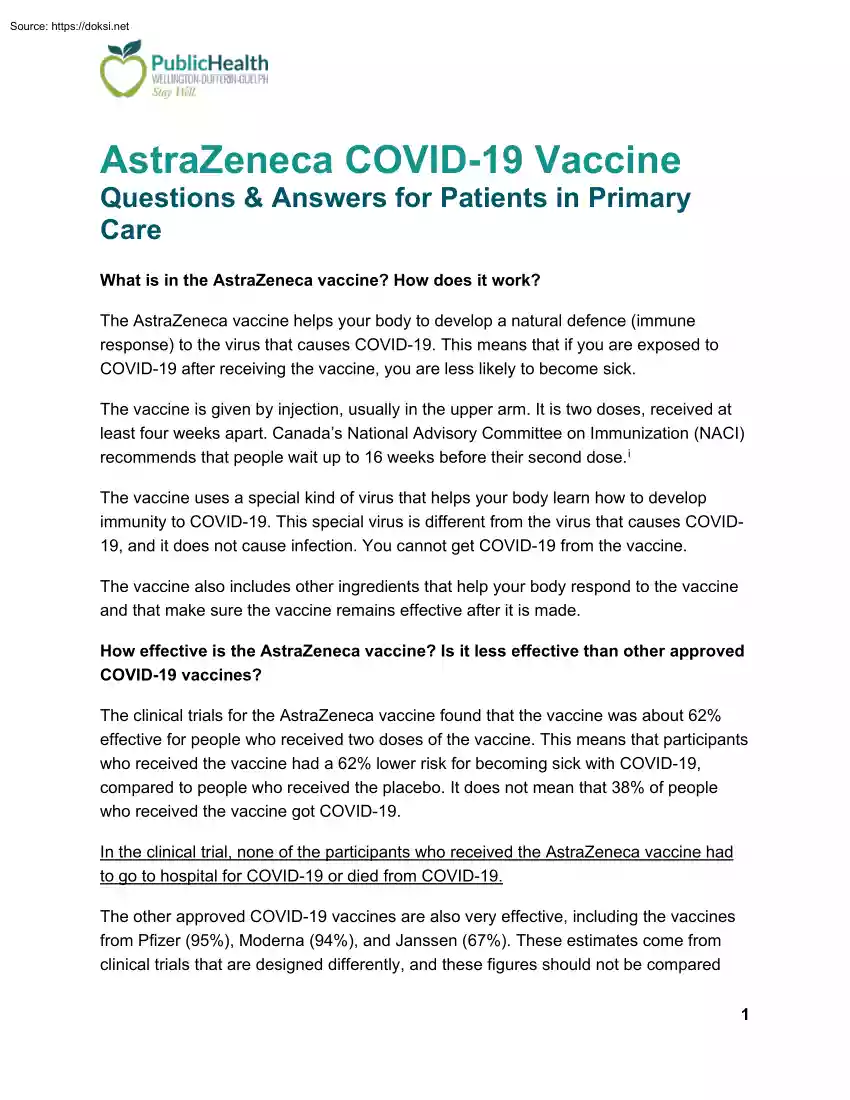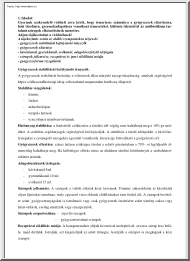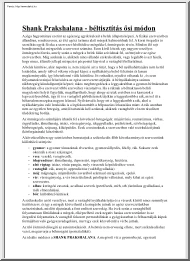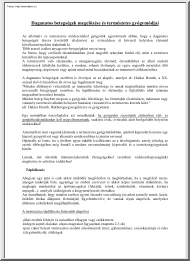Datasheet
Year, pagecount:2021, 4 page(s)
Language:English
Downloads:3
Uploaded:June 14, 2021
Size:728 KB
Institution:
-
Comments:
Attachment:-
Download in PDF:Please log in!
Comments
No comments yet. You can be the first!Content extract
AstraZeneca COVID-19 Vaccine Questions & Answers for Patients in Primary Care What is in the AstraZeneca vaccine? How does it work? The AstraZeneca vaccine helps your body to develop a natural defence (immune response) to the virus that causes COVID-19. This means that if you are exposed to COVID-19 after receiving the vaccine, you are less likely to become sick. The vaccine is given by injection, usually in the upper arm. It is two doses, received at least four weeks apart. Canada’s National Advisory Committee on Immunization (NACI) recommends that people wait up to 16 weeks before their second dose. i The vaccine uses a special kind of virus that helps your body learn how to develop immunity to COVID-19. This special virus is different from the virus that causes COVID19, and it does not cause infection You cannot get COVID-19 from the vaccine The vaccine also includes other ingredients that help your body respond to the vaccine and that make sure the vaccine remains effective
after it is made. How effective is the AstraZeneca vaccine? Is it less effective than other approved COVID-19 vaccines? The clinical trials for the AstraZeneca vaccine found that the vaccine was about 62% effective for people who received two doses of the vaccine. This means that participants who received the vaccine had a 62% lower risk for becoming sick with COVID-19, compared to people who received the placebo. It does not mean that 38% of people who received the vaccine got COVID-19. In the clinical trial, none of the participants who received the AstraZeneca vaccine had to go to hospital for COVID-19 or died from COVID-19. The other approved COVID-19 vaccines are also very effective, including the vaccines from Pfizer (95%), Moderna (94%), and Janssen (67%). These estimates come from clinical trials that are designed differently, and these figures should not be compared 1 directly to one another. Additionally, a vaccine’s effectiveness in a clinical trial can be different
from its effectiveness in the real world. The AstraZeneca vaccine is being used in other parts of the world, such as Europe. Studies are being done to determine how effective the vaccine is, and the results so far are encouraging. A study from Scotland, for example, found that a single dose of the AstraZeneca vaccine was 94% effective at preventing COVID-19 hospitalization in the general population, and 81% effective for the oldest adults (age 80 years and older). ii Who is recommended to receive the AstraZeneca vaccine? The AstraZeneca vaccine has been approved by Health Canada for adults 18 years of age and older. iii When clinical trials were done for the AstraZeneca vaccine, relatively few of the participants were older adults. As a result, the clinical trials had difficulty determining whether the vaccine was effective in older adults, specifically. Right now, Canada’s National Advisory Committee on Immunization (NACI) recommends that adults 65 years of age and older receive a
different COVID-19 vaccine. iv Adults 64 years of age and younger can receive any of the available COVID-19 vaccines. For this age group, NACI recommends that the AstraZeneca vaccine be offered if the advantages of getting a vaccine earlier outweigh the disadvantages of receiving a less effective vaccine. v Given that COVID-19 is still common in the Wellington-Dufferin-Guelph area, it is better to get the AstraZeneca vaccine now than to wait to get a different vaccine later. Some people should not receive the AstraZeneca vaccine if, for example, they have had an allergic reaction to one of the ingredients in the vaccine (such as Polysorbate 80, which is used in other vaccines). Your health care provider will let you know if there is a reason why you should not receive this vaccine. 2 What at the side effects of the AstraZeneca vaccine? Like all vaccines, the AstraZeneca vaccine can cause side effects in some people who receive it. The kinds of side effects that it causes are
similar to side effects for other vaccines. In general, these side effects are mild/moderate and go away after a few days. Side effects that occurred during the clinical trials include: vi Very Common Common (may affect more than 1 in 10 people) (may affect up to 1 in 10 people) • Tenderness, pain, warmth, redness, itching, or swelling at the injection site • Fever • Being sick (vomiting) or diarrhea • Generally feeling unwell Uncommon • Feeling tired (fatigue) (may affect up to 1 in 100 people) • Chills • Sleepiness or feeling dizzy • Headache • Decreased appetite • Feeling sick (nausea) • Enlarged lymph nodes • Joint pain or muscle ache • Excessive sweating, itchy skin, or rash Other side effects can occur. If you experience other side effects, tell your health care provider. Seek medical attention right away if you develop symptoms that could be an allergic reaction. These include: • Hives (bumps on the skin that are often
very itchy) • Swelling of the face, tongue, or throat • Difficulty breathing 3 If I get the AstraZeneca vaccine, can I get a different COVID-19 vaccine in the future? Right now, the National Advisory Committee on Immunization (NACI) recommends that people who get a first dose of a COVID-19 vaccine get their second dose using the same vaccine. vii However, scientists are exploring whether or not it is OK to ‘mix and match’ different vaccines and are working to understand how that impacts the overall effectiveness of the vaccines. Additional information to answer this question is expected later in 2021. Where can I get more information about the AstraZeneca vaccine and other COVID-19 vaccines? • Wellington-Dufferin-Guelph Public Health – COVID-19 Vaccine Information • Government of Ontario – COVID-19 vaccines for Ontario • Government of Canada – Vaccines for COVID-19
https://www.canadaca/en/public-health/services/immunization/national-advisory-committee-on-immunizationnaci/rapid-response-extended-dose-intervals-covid-19-vaccines-early-rollout-population-protectionhtml ii https://www.edacuk/files/atoms/files/scotland firstvaccinedata preprintpdf iii https://covid-vaccine.canadaca/info/pdf/astrazeneca-covid-19-vaccine-pm-enpdf iv https://www.canadaca/en/public-health/services/immunization/national-advisory-committee-on-immunizationnaci/recommendations-use-covid-19-vaccineshtml v https://www.canadaca/en/public-health/services/immunization/national-advisory-committee-on-immunizationnaci/recommendations-use-covid-19-vaccineshtml vi https://covid-vaccine.canadaca/info/pdf/astrazeneca-covid-19-vaccine-pm-enpdf vii https://www.canadaca/en/public-health/services/immunization/national-advisory-committee-onimmunization-naci/recommendations-use-covid-19-vaccineshtml i 4
after it is made. How effective is the AstraZeneca vaccine? Is it less effective than other approved COVID-19 vaccines? The clinical trials for the AstraZeneca vaccine found that the vaccine was about 62% effective for people who received two doses of the vaccine. This means that participants who received the vaccine had a 62% lower risk for becoming sick with COVID-19, compared to people who received the placebo. It does not mean that 38% of people who received the vaccine got COVID-19. In the clinical trial, none of the participants who received the AstraZeneca vaccine had to go to hospital for COVID-19 or died from COVID-19. The other approved COVID-19 vaccines are also very effective, including the vaccines from Pfizer (95%), Moderna (94%), and Janssen (67%). These estimates come from clinical trials that are designed differently, and these figures should not be compared 1 directly to one another. Additionally, a vaccine’s effectiveness in a clinical trial can be different
from its effectiveness in the real world. The AstraZeneca vaccine is being used in other parts of the world, such as Europe. Studies are being done to determine how effective the vaccine is, and the results so far are encouraging. A study from Scotland, for example, found that a single dose of the AstraZeneca vaccine was 94% effective at preventing COVID-19 hospitalization in the general population, and 81% effective for the oldest adults (age 80 years and older). ii Who is recommended to receive the AstraZeneca vaccine? The AstraZeneca vaccine has been approved by Health Canada for adults 18 years of age and older. iii When clinical trials were done for the AstraZeneca vaccine, relatively few of the participants were older adults. As a result, the clinical trials had difficulty determining whether the vaccine was effective in older adults, specifically. Right now, Canada’s National Advisory Committee on Immunization (NACI) recommends that adults 65 years of age and older receive a
different COVID-19 vaccine. iv Adults 64 years of age and younger can receive any of the available COVID-19 vaccines. For this age group, NACI recommends that the AstraZeneca vaccine be offered if the advantages of getting a vaccine earlier outweigh the disadvantages of receiving a less effective vaccine. v Given that COVID-19 is still common in the Wellington-Dufferin-Guelph area, it is better to get the AstraZeneca vaccine now than to wait to get a different vaccine later. Some people should not receive the AstraZeneca vaccine if, for example, they have had an allergic reaction to one of the ingredients in the vaccine (such as Polysorbate 80, which is used in other vaccines). Your health care provider will let you know if there is a reason why you should not receive this vaccine. 2 What at the side effects of the AstraZeneca vaccine? Like all vaccines, the AstraZeneca vaccine can cause side effects in some people who receive it. The kinds of side effects that it causes are
similar to side effects for other vaccines. In general, these side effects are mild/moderate and go away after a few days. Side effects that occurred during the clinical trials include: vi Very Common Common (may affect more than 1 in 10 people) (may affect up to 1 in 10 people) • Tenderness, pain, warmth, redness, itching, or swelling at the injection site • Fever • Being sick (vomiting) or diarrhea • Generally feeling unwell Uncommon • Feeling tired (fatigue) (may affect up to 1 in 100 people) • Chills • Sleepiness or feeling dizzy • Headache • Decreased appetite • Feeling sick (nausea) • Enlarged lymph nodes • Joint pain or muscle ache • Excessive sweating, itchy skin, or rash Other side effects can occur. If you experience other side effects, tell your health care provider. Seek medical attention right away if you develop symptoms that could be an allergic reaction. These include: • Hives (bumps on the skin that are often
very itchy) • Swelling of the face, tongue, or throat • Difficulty breathing 3 If I get the AstraZeneca vaccine, can I get a different COVID-19 vaccine in the future? Right now, the National Advisory Committee on Immunization (NACI) recommends that people who get a first dose of a COVID-19 vaccine get their second dose using the same vaccine. vii However, scientists are exploring whether or not it is OK to ‘mix and match’ different vaccines and are working to understand how that impacts the overall effectiveness of the vaccines. Additional information to answer this question is expected later in 2021. Where can I get more information about the AstraZeneca vaccine and other COVID-19 vaccines? • Wellington-Dufferin-Guelph Public Health – COVID-19 Vaccine Information • Government of Ontario – COVID-19 vaccines for Ontario • Government of Canada – Vaccines for COVID-19
https://www.canadaca/en/public-health/services/immunization/national-advisory-committee-on-immunizationnaci/rapid-response-extended-dose-intervals-covid-19-vaccines-early-rollout-population-protectionhtml ii https://www.edacuk/files/atoms/files/scotland firstvaccinedata preprintpdf iii https://covid-vaccine.canadaca/info/pdf/astrazeneca-covid-19-vaccine-pm-enpdf iv https://www.canadaca/en/public-health/services/immunization/national-advisory-committee-on-immunizationnaci/recommendations-use-covid-19-vaccineshtml v https://www.canadaca/en/public-health/services/immunization/national-advisory-committee-on-immunizationnaci/recommendations-use-covid-19-vaccineshtml vi https://covid-vaccine.canadaca/info/pdf/astrazeneca-covid-19-vaccine-pm-enpdf vii https://www.canadaca/en/public-health/services/immunization/national-advisory-committee-onimmunization-naci/recommendations-use-covid-19-vaccineshtml i 4





